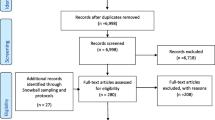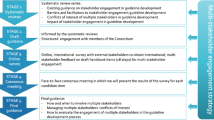Abstract
We examine how public sector third-party purchasers and hospitals negotiate quality targets when a fixed proportion of hospital revenue is required to be linked to quality. We develop a bargaining model linking the number of quality targets to purchaser and hospital characteristics. Using data extracted from 153 contracts for acute hospital services in England in 2010/2011, we find that the number of quality targets is associated with the purchaser’s population health and its budget, the hospital type, whether the purchaser delegated negotiation to an agency, and the quality targets imposed by the supervising regional health authority.
Similar content being viewed by others
Notes
The national targets were for risk assessment of admitted patients for venous thromboembolism and for patient satisfaction.
The target level of quality for the venous thromboembolism national goal was set nationally.
More generally, but equivalently for model specification purposes, we can assume that the choice of the number of targets has a monotonic increasing effect on quality and consequently on patient benefit.
Here and elsewhere subscripts on functions denote partial derivatives, so, for example, B n = ∂B/∂n, B nx = ∂(∂B/∂n)/∂x.
Hospital revenue R includes the CQUIN incentive payment which is a fixed proportion of the total payment for treating patients.
V and U are concave in n so that lnV and lnU are also concave in n and, since the sum of concave functions is concave, the first order condition is also sufficient.
Proof available from authors on request.
The assumption that B nh = B hn > 0 implies that B h (n *;·) > B h (0;·).
This covers 91 % of acute hospitals. Details of CQUIN contracts for the other 16 English acute hospital trusts were not available.
If an agency negotiated the contract we take the total expenditure of the PCTs for whom it negotiates.
Letting I k = (0,..,1,… 0) denote a vector with 1 in the kth position and 0 elsewhere, the coefficient on the kth explanatory variable is
$$\ln \left( {\frac{{\mu ({\mathbf{x}} + {\mathbf{I}}_{k} )}}{{\mu ({\mathbf{x}})}}} \right) = \ln \left( {\frac{{\exp (({\mathbf{x}} + {\mathbf{I}}_{k} ){\varvec{\upbeta}})}}{{\exp ({\mathbf{x\beta }})}}} \right) = \ln \left( {\exp (\beta_{k} )} \right) = \beta_{k}.$$
References
Barros, P.P., Martinez-Giralt, X.: Health economics. An industrial organization perspective. Routledge (2011)
Binmore, K., Rubinstein, A., Wolinsky, A.: The Nash bargaining solution in economic modeling. RAND J. Econ. 71(2), 176–188 (1986)
Brooks, J., Dor, A., Wong, H.: Hospital-insurer bargaining: an empirical investigation of appendectomy pricing. J. Health Econ. 16, 417–434 (1997)
Cameron, A.C., Trivedi, P.K.: Regression analysis of count data. Cambridge Books, Cambridge University Press, Cambridge (1998)
Chalkley, M., Malcomson, J.M.: Government purchasing of health services. In: Culyer, A.J., Newhouse, J.P. (eds.) Handbook of health economics. Elsevier, volume 1 of Handbook of health economics. Chapter 15, pp. 847–890
Chalkley, M., McVicar, D.: Choice of contracts in the British National Health Service: an empirical study. J. Health Econ. 27, 1155–1167 (2008)
Csaba, I., Fenn, P.: Contractual choice in the managed health care market. An empirical analysis. J. Health Econ. 16, 579–588 (1997)
Department of Health: Using the Commissioning for Quality and Innovation (CQUIN) payment framework. http://webarchive.nationalarchives.gov.uk/20130107105354, http://www.dh.gov.uk/prod_consum_dh/groups/dh_digitalassets/@dh/@en/documents/digitalasset/dh_091435.pdf (2008)
Elliott, R., Sutton, M., Ma, A., McConnachie, A., Morris, S., Rice, N., Skatun, D.: The role of the MFF in distributing NHS funding: taking account of differences in local labour market conditions. Health Econ. 19, 532–548 (2009)
Emmert, M., Eijkenaar, F., Kemter, H., Esslinger, A., Schoffski, O.: Economic evaluation of pay-for-performance in health care: a systematic review. Eur. J. Health Econ. 13, 755–767 (2012)
Farrar, S., Yi, D., Sutton, M., Chalkley, M., Sussex, J., Scott, A.: Has payment by results affected the way that English hospitals provide care? Difference-in-differences analysis. Br. Med. J. 339, 1–8 (2009)
Gaynor, M., Town, R.: Competition in health care markets. In: Pita Barros, P., Pauly, M. (eds.) Handbook of health economics, vol. 2, Elsevier (2012)
Greene, W.: Models for count data with endogenous participation. Empir Econ. 36, 133–173 (2009)
Grennan, M.: Price discrimination and bargaining: empirical evidence from medical devices. Am. Econ. Rev. 103, 145–177 (2013)
Houle, S., McAlistair, F., Jackevicius, C., Chuck, A., Tsuyuki, R.: Does performance-based remuneration for individual health care practitioners affect patient care? A systematic review. Ann. Int. Med. 157, 889–899 (2012)
Kristensen, S., McDonald, R., Sutton, M.: Should pay-for-performance schemes be locally-designed? Evidence from the Commissioning for Quality and Innovation (CQUIN) Framework in England. J. Health Ser. Res. Policy 18(2), 38–49 (2013)
Maddala, G.S.: Limited dependent and qualitative variables in econometrics. Cambridge Books, Cambridge University Press, Cambridge (1986)
Miranda, A., Rabe-Hesketh, S.: Maximum likelihood estimation of endogenous switching and sample selection models for binary, ordinal and count variables. Stata J. 6(3), 285–308 (2006)
Morris, S., Carr-Hill, R., Dixon, P., Law, M., Rice, N., Sutton, M., Vallejo-Torres, L.: Combining Age Related and Additional Needs (CARAN) report. http://webarchive.nationalarchives.gov.uk/20130107105354, http://www.dh.gov.uk/prod_consum_dh/groups/dh_digitalassets/documents/digitalasset/dh_093169.pdf (2007)
NHS: NHS Institute for Innovation and Improvement, Commissioning for Quality and Innovation (CQUIN) payment framework (2009)
Petsoulas, C., Allen, P., Hughes, D., Vincent-Jones, P., Roberts, J.: The use of standard contracts in the English National Health Service: a case study analysis. Soc. Sci. Med. 73, 185–192 (2011)
Ryan, A., Blustein, J.: Making the best of hospital pay for performance. N. Engl. J. Med. 366(17), 1557–1559 (2012)
Scott, A., Sivey, P., Ait Ouakrim, D., Willenberg, L., Naccarella, L., Furler, J., Young, D.: The effect of financial incentives on the quality of health care provided by primary care physicians (Review). The Cochrane Library, Issue 9 (2009)
Siciliani, L., Stanciole, A.: Bargaining and the provision of health services. Eur. J. Health Econ. 14, 391–406 (2013)
Street, A., Maynard, A.: Payment by results: qualified ambition? Health Econ. Policy Law 2, 445–448 (2007)
Verzulli, R., Goddard, M., Jacobs, R.: Do hospitals respond to greater autonomy? Evidence from the English NHS. Centre for Health Economics, Research Paper 64 (2011)
Werner, R., Konetzka, T., Polsky, D.: The effect of pay-for-peformance in nursing homes: evidence from State Medicaid programs. Health Serv. Res. (2013). doi:10.1111/1475-6773.12035
Acknowledgments
The research was funded by a grant from the Department of Health Policy Research Programme. The views expressed are those of the authors and not necessarily those of the funders. The authors are grateful for helpful comments from the Editor and referee and from participants in the Royal Economic Society (RES) conference in Cambridge, 2012.
Author information
Authors and Affiliations
Corresponding author
Rights and permissions
About this article
Cite this article
Fichera, E., Gravelle, H., Pezzino, M. et al. Quality target negotiation in health care: evidence from the English NHS. Eur J Health Econ 17, 811–822 (2016). https://doi.org/10.1007/s10198-015-0723-8
Received:
Accepted:
Published:
Issue Date:
DOI: https://doi.org/10.1007/s10198-015-0723-8




